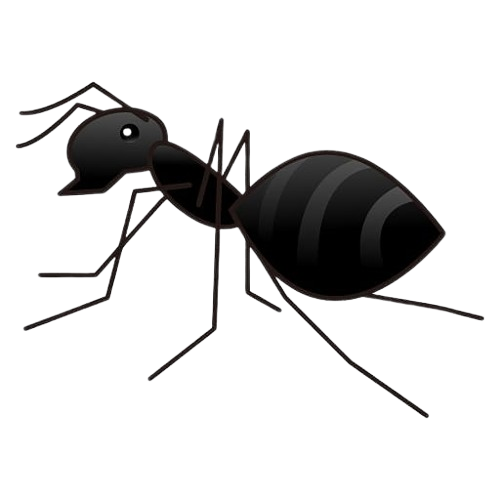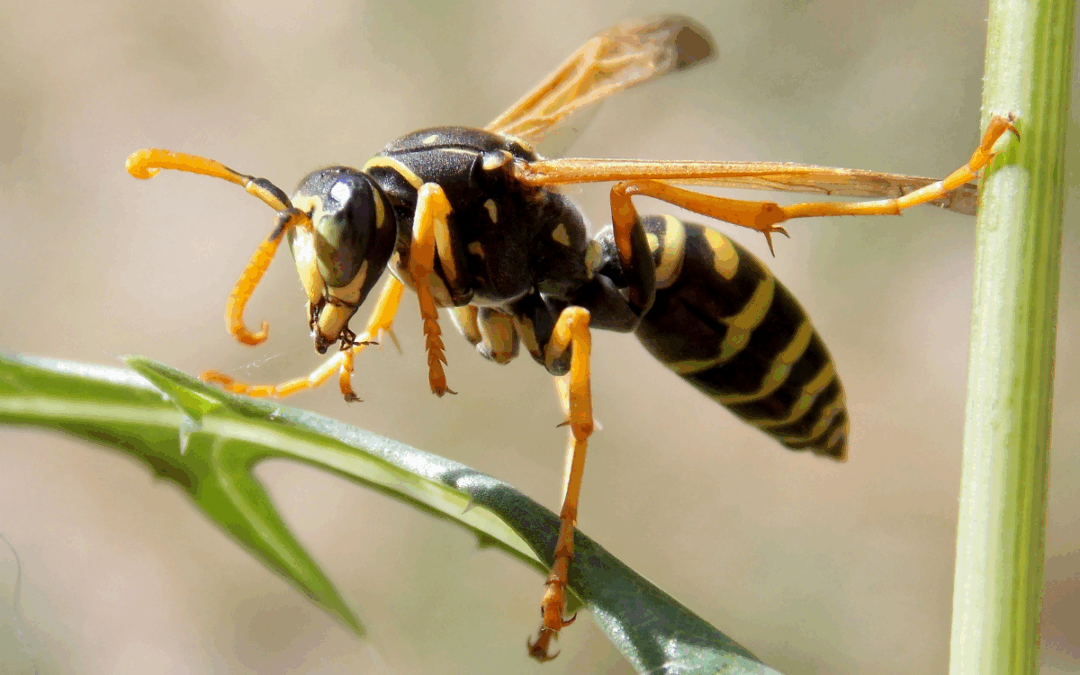
Aug 13, 2025 | Florida Pest Control
Pompano, Florida, is no stranger to summer heat and sunshine, but with the higher temperatures comes an increase in wasp and hornet activity. These stinging insects become more active during July, making their presence around homes and outdoor spaces both a nuisance and a potential hazard. Fortunately, with the right preventive measures, you can keep these uninvited guests at bay. Here’s how to protect your Pompano home from wasps and hornets while minimizing stings and infestations.
Stinging Insects: Wasps and Hornets
Why Are Wasps and Hornets More Active During Summer?
The heat of summer in Florida creates ideal conditions for wasps and hornets to thrive. By July, their colonies are in full swing, and worker insects are busy foraging for food to support their growing nests. Factors contributing to their heightened presence include:
- Rising Temperatures: Warm weather speeds up the growth of wasp and hornet populations.
- Abundant Food Sources: Summer outdoor dining and garbage bins attract these insects, as they feed on sweet and protein-rich foods.
- Nesting Season: Wasps and hornets actively build and maintain nests in shaded or sheltered spots around homes.
Understanding their seasonal behavior is the first step in preventing these pests from settling too close to your property.
Practical Tips for Wasp and Hornet Prevention
Preventing wasps and hornets from building nests near your home can save you from stressful encounters and potential stings. Use these strategies to make your space less appealing to them:
- Remove Attractants
- Keep garbage bins tightly sealed and clean up food spills, crumbs, and sugary residue promptly.
- Use mesh covers or lids during picnics and barbecues to deter wasps from hovering around plates and cups.
- Avoid leaving pet food outside for long periods, as it can also attract wasps and hornets.
- Eliminate Potential Nesting Sites
- Check roof eaves, tree branches, sheds, and attics for early signs of nest construction.
- Seal cracks, gaps, or holes near windows, doors, walls, and roofing with caulk or mesh screens.
- Trim hedges, clear debris, and keep firewood stacked away from your home to reduce nesting opportunities.
- Use Natural Deterrents
- Citrus, peppermint, and citronella oils repel wasps. Mix a few drops with water in a spray bottle and apply near potential nesting areas.
- Place lemon halves studded with cloves on outdoor tables as repellents.
- Plant lavender, basil, or spearmint in your garden to discourage wasps and hornets.
Steps for Managing Nests
Despite your best efforts, wasps and hornets may still build nests near your home. Managing nests requires caution:
- Identify Nest Location: Common spots include under eaves, around sheds, inside hollow tree trunks, or underground for hornets.
- Remove Small Nests Early:
- Wait until dusk or dawn when activity is low.
- Wear protective clothing and gloves.
- Use sprays or soapy water to immobilize insects before carefully knocking down the nest with a long object.
- Call Professionals for Larger Nests: For established or large nests, certified pest control technicians in Pompano can remove them safely and efficiently.
Minimizing the Risk of Stings
Sometimes encounters with wasps and hornets are unavoidable, but you can reduce the chance of being stung by following these tips:
- Stay calm and avoid sudden movements or swatting.
- Wear light, neutral-colored clothing instead of bright colors or floral patterns.
- Avoid strong scents like perfumes, colognes, or heavily scented lotions.
- Cover open food and sugary drinks when outdoors.
Professional Wasp and Hornet Control in Pompano
For persistent problems or large nests, rely on local pest control services with experience in wasp and hornet management. They provide effective solutions to eliminate nests and reduce insect activity around your home.
Wasps and hornets are a natural part of Florida summers, but they don’t have to disrupt your home life. By removing attractants, applying prevention techniques, and addressing nests promptly, you can enjoy a more comfortable, sting-free environment in Pompano this July.

Jun 12, 2025 | Florida Pest Control
Ghost ants are a common nuisance in Florida, especially during warm, humid months. Small but persistent, they often invade homes in search of food and moisture. Their pale, translucent bodies and dark heads make them hard to spot, and their ability to form multiple colonies indoors makes them tough to eliminate. Knowing where they hide and how to prevent them is key to keeping these tiny pests out.
A Guide to Ghost Ants in Florida
Top Signs of a Ghost Ant Infestation
Ghost ants are drawn to moisture and sweets, often showing up in kitchens and bathrooms. Here’s how to spot an infestation:
- Visible Ant Trails: Fast-moving lines of ants along counters or walls, especially near sugary spills.
- Clusters Near Moisture: Found around sinks, leaky pipes, or humid spots.
- Sweet Smell When Crushed: A faint, sugary scent may be noticeable when ants are squashed.
If you spot any of these signs, act quickly to prevent the problem from spreading.
Where They Like to Hide
Ghost ants are masters of staying out of sight, which makes them especially challenging to deal with. They can squeeze into incredibly tight spaces and establish nests in various hidden areas. Here are some of their favorite hiding spots:
1. Behind Baseboards
Baseboards provide a discreet entry point as well as a cozy nesting area. These spots are particularly appealing in homes with moisture issues.
2. Under Sinks
Leaky pipes and damp cabinets create ideal conditions for these ants. Inspect these areas frequently, as they’re a common hotspot for ant activity.
3. Potted Plants
Ghost ants often nest within the moist soil of indoor plants, so be sure to check for unusual movement around your greenery.
4. Inside Electrical Outlets
Small spaces like electrical outlets or wall voids are perfect for these ants to build nests and expand their colonies unnoticed.
5. Kitchen Appliances
Ghost ants are drawn to food sources, and kitchen appliances often provide hidden crumbs and moisture. Check behind refrigerators, under toasters, and inside cabinets for signs of activity.
How to Prevent and Get Rid of Ghost Ants
Ghost ants are persistent, but with a few proactive steps, you can keep them out.
Prevention Tips:
- Clean Up Food: Wipe counters, clear crumbs, and store food in airtight containers.
- Fix Leaks: Repair pipes and reduce moisture in kitchens and bathrooms.
- Seal Entry Points: Close gaps around windows, doors, and baseboards with caulk or weather stripping.
- Check Plants: Don’t overwater and inspect indoor plants for signs of ants.
How to Get Rid of Them:
- Use Baits: Place sweet or protein-based ant baits along active trails.
- Erase Trails: After you have eliminated the ants, clean surfaces with vinegar and water to disrupt scent paths.
- Try Natural Repellents: Diatomaceous earth and essential oils like peppermint can help deter them.
Because ghost ants form multiple colonies, a persistent problem may need professional treatment.
Don’t Ignore Ghost Ants
Ghost ants may be tiny, but the inconvenience they bring is anything but small. By understanding the signs of an infestation and taking proactive steps to prevent them, you can keep your home ant-free and comfortable year-round. Contact a trusted pest control professional for expert advice and effective treatments to reclaim your home today!

May 6, 2025 | Florida Pest Control
Attics in Pompano Beach, Florida, may offer hidden shelter for pests like rodents, termites, and bats. The area’s warm climate and humid conditions create the perfect environment for infestations. Quiet, dark, and full of food sources like wood and insulation, attics quickly become a pest haven. But homeowners can take smart steps to keep attic pests from infesting!
What To Know About Attic Pests
Why Pests Love Attics
Pests are naturally drawn to attics for several reasons:
- Warmth and Shelter: Whether escaping outdoor heat or cooler weather, attics provide consistent refuge.
- Accessibility: Gaps and cracks in roofs or vents make entry easy.
- Secure Hideaways: Attics are often undisturbed spaces, ideal for nesting.
The good news? With proactive measures, you can stop attic pests from settling in.
Steps to Keep Your Attic Pest-Free
1. Regular Inspections
Schedule routine attic checks for signs of pests, such as droppings, nests, or gnawed materials. Professionals can perform thorough inspections to catch what you might miss — and recommend preventative steps like attic insulation services, which help block pests while improving energy efficiency.
2. Seal Entry Points
Prevent access by sealing cracks, damaged vents, and other potential entry points. Use caulk, wire mesh, or steel wool to block openings. Regularly inspect your roof, chimney, and attic for damage.
3. Manage Humidity and Clutter
Attic pests thrive in damp and cluttered spaces. Address these issues by:
- Using dehumidifiers to reduce moisture.
- Ensuring proper attic ventilation.
- Organizing storage in sealed plastic bins instead of cardboard boxes.
4. Remove Food and Water Sources
Take steps outside your home to reduce the attraction of pests:
- Clean gutters to prevent standing water.
- Fix roof leaks promptly.
- Trim tree branches near your roof to limit pest access.
5. Use Eco-Friendly Pest Control
If pests invade, opt for environmentally healthy solutions. Natural repellents like peppermint and citrus sprays, humane traps, and diatomaceous earth are effective and toxin-free.
Why Prevention Matters
An attic infestation can lead to serious issues. Rodents chew electrical wiring, increasing fire risks, while termites and carpenter ants damage structural integrity. Pest droppings also pose health risks, and severe infestations can be costly to resolve. Prevention protects your home, health, and wallet.
Take Action
Keeping pests out of your attic is achievable. With regular maintenance, sealed entry points, and eco-friendly pest control, your attic can remain a pest-free zone. Don’t wait for pests to settle in; act now to protect your home and family.
Need help? Contact a trusted pest control professional to ensure your attic stays off-limits to unwanted visitors. Give us a call or click the button below to get started with your FREE quote.

Apr 18, 2025 | Florida Pest Control
Living in South Florida means sunshine, beaches, and unfortunately—pests. The region’s warm, humid climate creates the perfect environment for insects and wildlife to thrive year-round. Whether it’s ants in your kitchen, termites in your walls, or mosquitoes in your backyard, pests can become a serious problem for homeowners and business owners alike. So when an infestation strikes, your first question is likely, “How do I choose the best pest control near me?“
In this blog, we’ll explore what makes a pest control company stand out, the types of pests commonly found in South Florida, treatment methods to expect, and the benefits of hiring a professional. By the end, you’ll know exactly what to look for—and what to avoid—when choosing a local pest exterminator to keep your property pest free.
Why Choosing the Right Pest Control Company Matters
Pest control is not just about killing bugs—it’s about protecting your home or business, your health, and your peace of mind. An ineffective or careless pest control approach can lead to recurring infestations, property damage, and even exposure to harmful chemicals.
Choosing the best pest control near you ensures that you’re getting expert knowledge, safe and targeted treatment options, and long-lasting results. Whether you’re dealing with a current pest problem or want to prevent one before it starts, the right pest control company can make all the difference.
What to Look for in the Best Pest Control Near Me
With so many pest control companies offering their services in South Florida, it’s important to know how to evaluate your options. Here’s what to consider when choosing a provider:
1. Experience and Reputation
Look for companies that have years of experience serving your local area. Read reviews on Google, Yelp, or the Better Business Bureau to see how past clients rate their services. A strong reputation is a reliable indicator of quality work.
2. Licensed and Insured Technicians
Always ensure that the pest control company is fully licensed and insured in the state of Florida. This not only protects you but also guarantees that their technicians are trained and certified in safe application practices.
3. Range of Services Offered
The best companies don’t just spray and leave—they offer a variety of solutions to address different pest issues. Whether you’re dealing with rodents, roaches, termites, or wildlife, a full-service provider should have specialized treatment plans for each type of pest.
4. Use of Eco-Friendly Solutions
If you’re concerned about your family, pets, or the environment, choose a company that offers eco-friendly pest control options. Many pest control services now incorporate green treatments that are just as effective as traditional chemicals but safer for your home and surroundings.
5. Local Expertise
When searching for the “best pest control near me,” prioritize companies that are locally owned and operated. A local pest exterminator will be more familiar with the seasonal pest patterns and common pest species in South Florida, allowing them to tailor their treatments more effectively.
6. Customer Service and Guarantees
Top pest control companies stand behind their work. Ask about warranties, satisfaction guarantees, and follow-up services. Clear communication, responsive customer service, and transparency in pricing are all signs of a trustworthy provider.
Common Pests Treated in South Florida
South Florida is home to a wide range of common pests that can invade both homes and businesses. A reputable pest control company should be equipped to handle them all. Here are a few of the most frequent offenders:
1. Ants
From tiny sugar ants to invasive carpenter ants, these pests are persistent and often difficult to eliminate without professional help.
2. Termites
Subterranean and drywood termites cause significant structural damage if not caught early. Annual inspections and preventive treatments are essential.
3. Cockroaches
Roaches are not only disgusting—they carry bacteria and can worsen allergies. German and American cockroaches are the most common in South Florida.
4. Mosquitoes
Known for spreading diseases like West Nile and Zika virus, mosquitoes are a serious outdoor nuisance in Florida’s climate.
5. Rodents
Mice and rats can chew through wires, contaminate food, and multiply quickly. Integrated rodent control is a must in urban and suburban settings.
6. Spiders and Stinging Insects
Wasps, hornets, fire ants, and venomous spiders like the black widow can pose health risks, especially to children and pets.
7. Bed Bugs and Fleas
These blood-sucking pests are notoriously hard to eliminate. Professional heat treatments and thorough inspections are often required.
Types of Pest Control Treatments Available
Top-tier pest control services offer a variety of treatment plans to target the specific pests in and around your property. These methods can be customized based on your needs, whether you’re dealing with a one-time issue or need year-round protection.
1. Integrated Pest Management (IPM)
The best pest control companies use Integrated Pest Management, a science-based approach that combines prevention, monitoring, and control. IPM minimizes pesticide use and focuses on long-term solutions, making it ideal for environmentally conscious customers.
2. Eco-Friendly Treatments
Many South Florida companies now offer green pest control options made with natural or low-toxicity ingredients. These eco-friendly products are especially useful in homes with children, pets, or sensitive individuals.
3. Baiting Systems
Bait stations are commonly used for ants, cockroaches, and termites. They attract pests to a food source laced with a slow-acting poison that’s taken back to the colony for widespread elimination.
4. Barrier Sprays
Used for both indoor and outdoor applications, barrier sprays create a protective zone around your property to keep pests out.
5. Fumigation
For severe infestations—especially of drywood termites—whole-structure fumigation may be necessary. This is a more invasive option, typically requiring vacating the property for a few days.
6. Exclusion and Sealing Services
To keep pests from coming back, many companies offer exclusion services that seal up cracks, gaps, and other entry points.
7. Ongoing Maintenance Plans
Routine pest control services ensure that pests don’t return. Many companies offer monthly, bi-monthly, or quarterly plans depending on your needs.
Benefits of Hiring Professional Pest Control Services
While DIY traps and sprays may work for a while, they often only address the surface of a much larger issue. Here are a few reasons why hiring a professional pest control company is the smart choice:
Accurate Identification of Pests
Not all pests are created equal. A trained technician can correctly identify the type of infestation and choose the most effective treatment.
Long-Term Results
Professionals don’t just treat the problem—they get to the root of it. This ensures that infestations don’t reoccur a few weeks later.
Safety First
From using child- and pet-safe products to proper handling of hazardous chemicals, professional services reduce health risks to your family or employees.
Cost-Effective Over Time
While DIY solutions may seem cheaper initially, recurring infestations can cost you more in the long run. Professional pest control saves you time, stress, and money.
Peace of Mind
Knowing your home or business is being protected by experts gives you the confidence to focus on what matters most.
What Homes and Businesses Should Expect
Whether you’re a homeowner dealing with ants in the kitchen or a business owner concerned about rodents in your restaurant, the best pest control near you should deliver:
-
Thorough inspections of your property
-
Customized treatment plans based on your needs
-
Transparent pricing and clear explanations
-
Regular maintenance options to stay pest free
-
Friendly, professional service every time
Look for a pest control provider that understands the unique needs of both residential and commercial properties in South Florida.
Final Thoughts: How to Find the Best Pest Control Near Me
Finding the best pest control near you isn’t just about hiring someone with a sprayer—it’s about partnering with a company that truly cares about protecting your property. Look for a local pest exterminator with a strong reputation, a wide range of services, eco-friendly options, and a dedication to customer satisfaction.
Don’t wait until pests take over your home or business. Whether you’re battling a current infestation or want to prevent one in the future, a proactive approach with the right company will keep you pest free all year long.
Ready to Protect Your Property?
Let us help you reclaim your space from unwanted pests. We proudly serve homes and businesses across South Florida with safe, effective, and affordable pest control solutions.
Call or click the link below to request your FREE quote today and discover why we’re the trusted choice for pest control in your neighborhood.

Apr 18, 2025 | Florida Pest Control
Living in Pompano Beach means enjoying warm weather year-round, but it also comes with dealing with seasonal pests. The city’s tropical climate creates perfect conditions for pests like mosquitoes, termites, ants, and rodents. Here’s how to protect your home effectively, regardless of the season, with pest control near me.
Pest Control Near Me For Seasonal Pests
Why Pests Thrive in Pompano Beach
Pompano Beach’s humid weather and lush surroundings make it an ideal breeding ground for pests. Each season brings its own challenges:
- Spring/Summer: Rainy months lead to increased mosquito and termite activity.
- Fall: Rodents and ants seek warmth and food indoors.
- Winter: Cooler evenings drive roaches and spiders inside for shelter.
Knowing these patterns can help you take proactive measures to stay pest-free.
Essential Pest Control Tips
1. Keep Your Outdoors Pest-Free
- Trim trees and bushes near your home.
- Remove debris, wood piles, and overgrown vegetation.
- Seal trash bins tightly to deter pests like raccoons and ants.
2. Block Entry Points
- Replace damaged weather stripping around doors and windows.
- Seal cracks in walls, foundations, and around utility lines.
- Install mesh screens over vents and chimneys.
3. Eliminate Moisture
- Fix leaks and ensure proper drainage.
- Clean gutters to prevent standing water.
- Use dehumidifiers in damp areas like basements or bathrooms.
4. Safeguard Your Food
- Store pantry items in airtight containers.
- Clean up crumbs and spills promptly.
- Take out food waste trash regularly to avoid odors attracting pests.
5. Use Natural Remedies
- Apply essential oils like peppermint or citrus around windows and doors to deter pests.
- Plant herbs like basil and lavender to naturally repel bugs outdoors.
- Sprinkle diatomaceous earth in areas prone to crawling pests.
6. Partner with a Pest Control Expert
Professional pest control services can provide tailored solutions for Pompano Beach pests, using targeted, eco-friendly treatments to address infestations effectively.
Stay Pest-Free Year-Round
Consistency is key to keeping your home comfortable and pest-free. By combining preventative measures with professional expertise from pest control near me, you can tackle seasonal pests and enjoy peace of mind in every season. Reach out to a local Pompano Beach pest control expert today for customized solutions and a pest-free home!
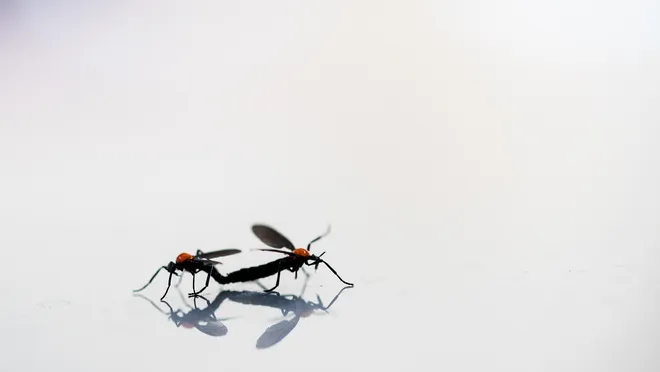
Feb 14, 2025 | Florida Pest Control
When Valentine’s Day rolls around, the presence of love is usually a good thing. But in Florida, there’s one kind of “love” you might wish to avoid—love bugs. These harmless but annoying pests thrive in Florida’s warm, humid weather, often causing widespread inconvenience for homeowners and drivers alike. If you’ve encountered love bugs and are searching for solutions without harming the environment, we’ve got you covered.
This blog will explore eco-friendly, non-toxic options to control love bugs while protecting your home—and the planet.
What Are Love Bugs and Why Are They a Problem?
Before we jump into solutions, let’s quickly understand who we’re dealing with. Love bugs, scientifically known as Plecia nearctica, are small, black insects that are attracted to light and warmth. You’ll often find them in pairs (hence the name “love bugs”) during their mating season, which occurs twice a year—spring and late summer.
While they don’t sting or bite, these flying pests are notorious for swarming homes, getting stuck on vehicles, and even damaging car paint with their acidic secretions. Left unchecked, love bugs can turn into a nuisance that’s especially hard to ignore during their peak seasons in Florida.
The Green Way to Get Rid of Love Bugs
Here’s how you can prevent and control love bugs without toxic chemicals, ensuring your Valentine’s Day—and every day after—is pest-free.
- Seal Entry Points
Prevention is the first step in green pest control. Love bugs are not strong fliers, which means they can easily enter your home through cracks, poorly sealed doors, and windows.
- Inspect your home for gaps and crevices.
- Seal all potential entry points using weather stripping, caulking, or screen meshes.
- Install fine mesh screens on windows and doors to keep bugs out while allowing fresh air in.
- Limit Artificial Lighting
Love bugs are attracted to light—particularly white and yellow lights—making your porch or outdoor areas a prime target.
- Opt for LED lights with colors like amber, orange, or red, which are less attractive to love bugs.
- Turn off outdoor lights when not in use or install motion-activated lighting instead.
- Use blackout curtains indoors to reduce light leakage at night.
- Natural Repellents and Home Remedies
Say goodbye to harmful sprays, and hello to healthier alternatives.
- Citrus Oil Spray: Love bugs dislike the smell of citrus. Mix water with a few drops of lemon or orange essential oil and spray it around windows, doors, and other high-activity areas.
- Neem Oil Spray: Widely recognized as a natural pest repellent, neem oil is less toxic for plants, pets, and people alike. Spray it in affected areas to keep love bugs at bay.
- Vinegar-Water Blend: For an easy DIY solution, mix equal parts white vinegar and water in a spray bottle. It’s non-toxic and helps discourage love bugs without harming the environment.
- Plant Bug-Repellent Flora
Love bugs may be fond of light and heat, but they have plants they dislike too! Incorporating natural deterrents into your landscaping is an excellent way to prevent infestations while beautifying your garden.
- Consider planting marigolds, basil, or citronella—all of which naturally repel insects.
- Maintain healthy plants by removing decaying leaves or flowers that can attract bugs.
- DIY Love Bug Traps
If swarms have already invaded your outdoor space, you can use homemade traps to catch them effectively without resorting to toxic pesticides.
Fill a shallow dish with water and add a few drops of dish soap. Place it near a light source outdoors. Love bugs will flock to the light and become trapped in the soapy water.
For larger areas, consider hanging a sticky card or non-toxic adhesive trap.
- Regular Maintenance and Cleaning
- A clean home and yard are less inviting to love bugs. Routine cleaning efforts can drastically reduce their presence over time.
- Power-wash the exterior of your house, including walls, windows, and patio spaces, to remove and discourage bugs.
- Clean out any leaf litter or standing water in your yard, as this can create breeding grounds for other insects that may attract these bugs.
- Frequently wash your car to remove any dead bugs, especially during high swarm seasons, to avoid damage to your vehicle’s paint.
Why It Matters to Show Your Love for the Environment
Using eco-conscious pest control methods is more than just a practical choice—it reflects a commitment to sustainability, protecting the environment for future generations. Florida’s unique ecosystem is home to a wealth of wildlife, pollinators, and beneficial species that chemical pesticides can harm. Taking a green approach ensures that you’re targeting only the bugs you want to remove, leaving everything else undisturbed.
Partner with Green Pest Control Experts
Sometimes, love bugs can be particularly persistent, especially during their mating season. If your DIY efforts aren’t enough, consider working with professional pest control companies that specialize in environmentally friendly solutions. Green pest control experts can assess your space, offer targeted interventions, and help maintain long-term pest-free environments—all while keeping harmful chemicals far away from your home.
Love Your Home, Love the Environment
It’s time to stop letting love bugs wreak havoc on your Florida home. With the green pest control strategies shared above and a local pest control expert near you, you can tackle these harmless but pesky invaders while keeping your commitment to environmental conservation intact. Whether you’re creating a citrus spray, rethinking your outdoor lighting, or sealing up your windows, every small step makes a big difference in keeping pests out and your home healthy.
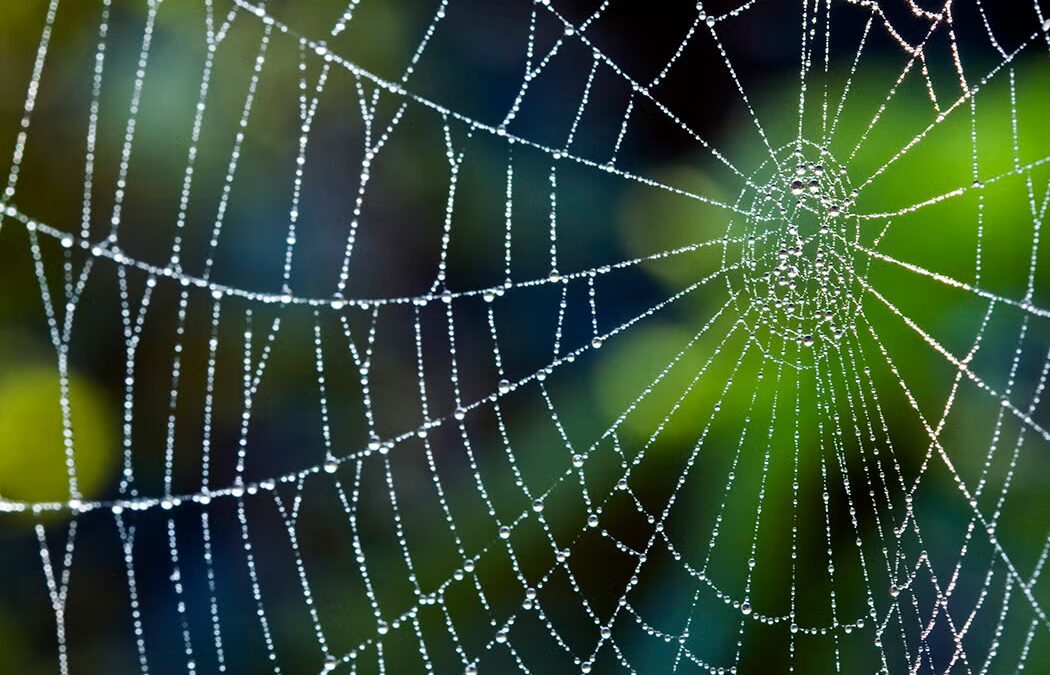
Feb 4, 2025 | Florida Pest Control
Living in Florida means enjoying the state’s lush ecosystems and warm climate—but it also means sharing your space with some unwelcome eight-legged visitors. While most spiders are harmless and even beneficial by controlling insect populations, others can pose serious risks if not properly identified and managed. If you’ve discovered a spider in your home or garden, this guide will help you recognize some of the most common spiders in Florida and give you the tools to handle them without causing any harm to you or them.
Common Spiders in Florida
Why Identifying Spiders in Your Home Matters
Spiders are nature’s pest controllers, reducing the need for chemical pesticides by preying on insects like flies and mosquitoes. However, not all spiders are friendly neighbors. Venomous species like the Brown Recluse and Black Widow can pose health risks to humans, which is why proper identification is essential. Knowing whether you can coexist or need professional help ensures that you take the right action.
For those focused on eco-friendly practices, understanding which spiders are harmless can allow you to protect beneficial species while maintaining a healthy environment around your home.
Florida’s Most Common Household Spiders
Black Widow
- Appearance: Shiny black body with a distinctive red hourglass marking on its underside.
- Size: Females are about 1.5 inches (with legs), while males are smaller.
- Habitat: Prefers sheltered spaces like woodpiles, garages, or under outdoor furniture.
- Risk Level: Black Widow venom is neurotoxic, causing muscle pain and cramps, and potentially serious health complications. Biting is usually a last resort, usually when they are inadvertently squeezed which can happen easily for example when someone is putting on outdoor shoes.
- How to Identify: Look for the unmistakable red hourglass on the abdomen and irregular, messy webs.
- What to Do: Call a professional for secure removal. Avoid handling them, as their bites can be dangerous.
Orb-Weaver Spider
- Appearance: Often tan or brightly colored with spiny or ornate patterns on the abdomen.
- Size: Up to over 3 inches.
- Habitat: Common in gardens, yards, and between trees, where they spin large, circular webs.
- Risk Level: Harmless to humans and beneficial for pest control.
- How to Identify: Their large, intricate webs are hard to miss in outdoor spaces.
- What to Do: Appreciate their role in pest control and allow them to thrive in your garden.
Jumping Spider
- Appearance: Compact, with either black or colorful bodies, large forward-facing eyes, and short legs.
- Size: Typically 1/4 to 1/2 inch.
- Habitat: Found indoors on walls, windowsills, or furniture, as well as outdoors.
- Risk Level: Non-venomous and shy, these spiders are harmless.
- How to Identify: These spiders leap rather than crawl and have large, prominent eyes.
- What to Do: They’re harmless, but if you prefer them outside, simply relocate them.
Wolf Spider
- Appearance: Brown, gray, or black with a robust, hairy body and distinct back markings.
- Size: 1/2 to 2 inches.
- Habitat: Often seen scurrying across floors in basements, garages, or on the ground outdoors.
- Risk Level: Though large, they are not dangerous.
- How to Identify: Wolf spiders don’t spin webs; they’re fast hunters that catch prey with their speed.
- What to Do: If you find one indoors, gently catch and release it outside.
Eco-Friendly Pest Control for Spiders
If you’re an environmentally conscious homeowner, there are several ways to manage spider populations while keeping your space pest free and sustainable:
Preventative Measures
- Declutter: Remove piles of leaves, wood, or debris near your home to eliminate spider hiding spots.
- Seal Entry Points: Inspect windows, doors, and any cracks or gaps to prevent spiders from entering.
- Reduce Outdoor Lighting: Use yellow or sodium vapor lights, which attract fewer insects and, in turn, fewer spiders.
Eco-Friendly Repellents
- Essential Oils: Spiders dislike peppermint, tea tree, and eucalyptus oils. Mix a few drops of water and spray in areas where spiders are active.
- Vinegar Solution: A simple mixture of equal parts vinegar and water can help deter spiders and clear away webs.
Why Spiders Matter in the Ecosystem
Before rushing to remove every spider, remember their ecological benefits:
- Natural Pest Control: Spiders help reduce the number of pests like mosquitoes and flies, which can be more bothersome than the spiders themselves.
- Part of the Food Chain: Spiders are prey for birds, reptiles, and other beneficial creatures.
By allowing harmless species to thrive in and around your home, you’re supporting a balanced ecosystem that benefits both your environment and your family.
Keep Your Home Spider-Free and Balanced
Living in Florida means sharing your space with spiders, but understanding which common spiders in Florida are beneficial and which are harmful will help you manage them responsibly. If you find yourself dealing with venomous spiders, don’t hesitate to contact a professional pest control service. Always prioritize eco-friendly methods for a pest-free home and a healthier local environment.
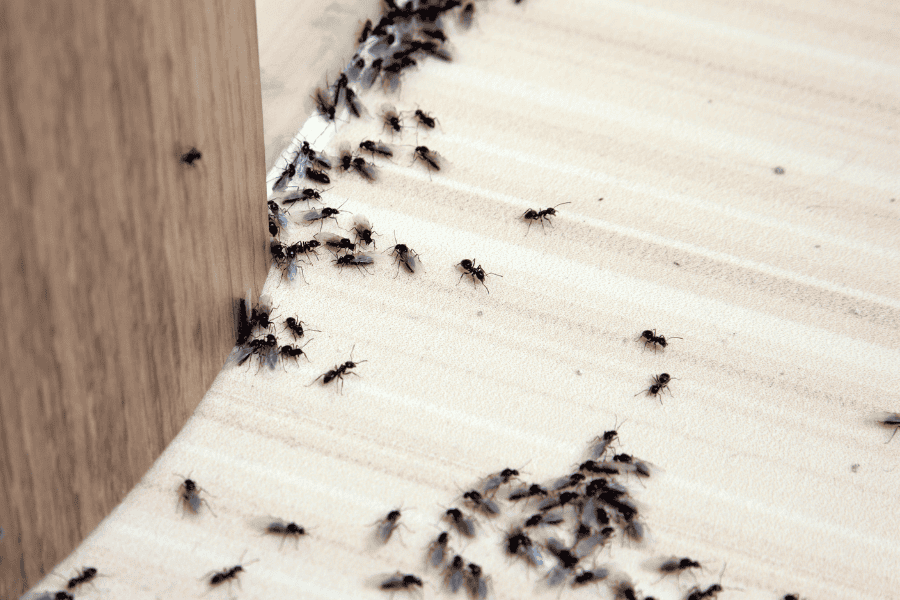
Jan 20, 2025 | Florida Pest Control, Going Green
Ants are small, but they can cause big frustrations in your Miami home. Whether it’s Argentine ants marching through your kitchen or fire ants invading your yard, Miami’s warm, humid climate makes the city a prime destination for these pests. Traditional pest control methods often involve harmful chemicals, but eco-friendly ant control alternatives provide effective solutions that are not harmful for your home, health, and the environment.
Here’s how Miami residents can keep ants at bay with natural, green pest control methods that work.
Eco-Friendly Ant Control Methods For Your Miami Home
Why Ants Invade Homes in Miami
Ants are always on the lookout for food, water, and shelter. Miami’s year-round warm weather, combined with the rainy season, creates the perfect environment for ants to thrive. They’re often attracted to crumbs, leaks, or even the smallest cracks in your home’s exterior.
Common Ant Species in Miami
Understanding which ant species you’re dealing with is key to effective pest control. Here are some common ants in Miami:
- Argentine Ants: Known for forming massive colonies, they can be difficult to eliminate.
- Carpenter Ants: These ants excavate wood, which can lead to structural damage over time.
- Fire Ants: Known for their painful stings, fire ants are a common problem outdoors.
- Ghost Ants: Small and light-colored, they often invade kitchens in search of sugary foods.
Eco-Friendly Pest Control for Ants in Miami
Natural Deterrents
Using natural substances to repel ants is a great first step to keeping them out of your home:
- Vinegar: A 50-50 mix of vinegar and water will disrupt ant trails and eliminate scent markers.
- Lemon Juice: Spray lemon juice near ant entry points to deter them.
- Essential Oils: Peppermint, tea tree, or cinnamon oils are highly effective in repelling ants when diluted in water.
DIY Ant Baits
Eco-friendly baits are a great way to target the colony itself. Mix sugar and boric acid into a paste and place it near ant trails. Worker ants will carry it back to the colony, slowly eradicating the infestation.
Diatomaceous Earth
Diatomaceous earth is a natural powder that can be sprinkled around your Miami home. It dehydrates ants and works effectively in places like baseboards and entryways.
Preventing Ants in Your Miami Home
Keep Your Miami Home Clean
Ants are attracted to crumbs and food residue. Ensure your Miami home is spotless by:
- Cleaning up spills and crumbs immediately.
- Storing food in airtight containers.
- Washing dishes promptly and keeping sinks clear.
Eliminate Water Sources
Fix leaking pipes and faucets in your Miami home and dry up moisture in kitchens and bathrooms. Ants are always on the lookout for water sources and removing them will discourage them from entering.
Seal Entry Points
Ants can sneak into your home through the smallest gaps. Be sure to:
- Seal cracks around windows, doors, and foundations.
- Install weather stripping to block gaps around exterior doors.
- Repair any tears in window screens.
Manage Your Miami Yard
Miami’s tropical environment provides a perfect place for ants to thrive. Here’s how to keep them out:
- Trim trees and bushes to prevent ants from reaching your home.
- Remove leaf litter and woodpiles near the foundation.
- Ensure outdoor trash bins have tight-fitting lids.
Use Ant-Repelling Plants
Certain plants can naturally repel ants while adding beauty to your home. Consider growing:
- Lavender
- Mint
- Rosemary
- Marigolds Plant these around your home’s entry points or in your garden to create a natural barrier.
Eco-Friendly Ant Control: A Miami Homeowner’s Guide
- Identify the ant species to target the right control methods.
- Use natural deterrents like vinegar, lemon juice, and essential oils.
- Create DIY solutions with boric acid baits and diatomaceous earth.
- Eliminate outdoor nests with boiling water.
- Prevent future infestations with cleanliness, sealing entry points, and yard management.
Go Green for an Ant-Free Miami Home
Miami’s warm climate makes ant infestations a common issue, but eco-friendly pest control solutions provide a greener way to protect your home. By using natural deterrents, sealing entry points, and focusing on prevention, you can keep your Miami home ant-free without relying on harmful chemicals. If you’re ready for a green pest control plan, contact a local pest control company for a free estimate.
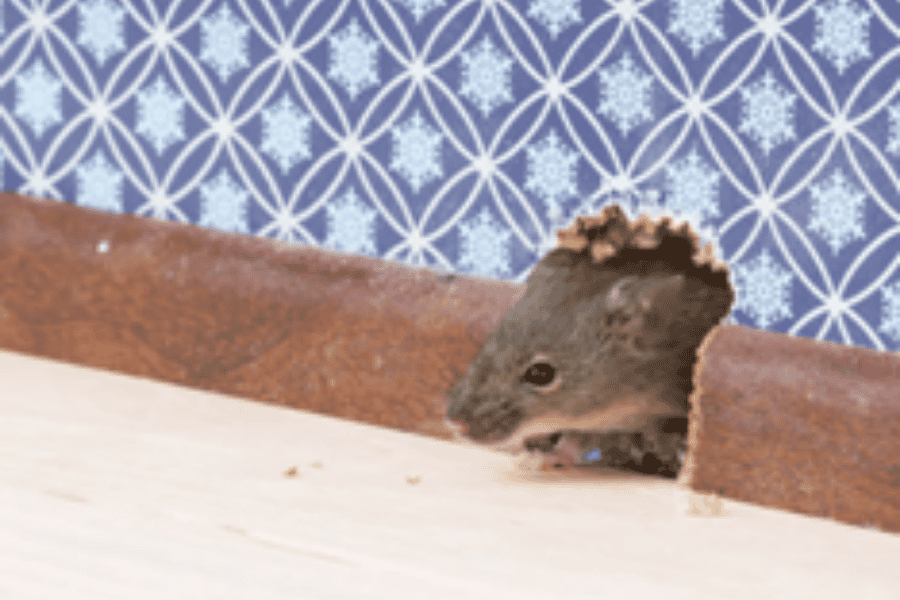
Jan 15, 2025 | Florida Pest Control
Rodents can cause serious damage to both your home and your health. If you live in Broward County, Florida, and want to protect your home from these pests, this guide will help you understand how to deal with rodent infestations effectively while keeping your living space safe.
This post will cover the types of rodents common in the area, why they’re such a problem, and the most effective ways to handle infestations. By the end, you’ll be equipped with practical solutions for dealing with rodents in your home.
Dealing With Rodent Infestations
Understanding Rodent Issues in Broward County
Florida’s warm, year-round climate is an ideal environment for rodents like rats and mice, which thrive in urban areas and can cause significant structural damage. Common rodents in Broward include Norway and roof rats, both of which are known to spread diseases and damage insulation, wiring, and wood.
Why Rodents Are a Persistent Problem in Florida:
- Ideal Climate: Florida’s mild winters allow rodents to breed year-round.
- Abundant Food Sources: Urban areas and gardens provide plenty of food for rodents.
- Coastal Proximity: Local waterways and vegetation provide shelter and easy access to homes.
Effective Rodent Control Methods
While managing a rodent infestation can be challenging, there are a number of effective ways to deal with it, from preventive measures to active control strategies.
Seal Entry Points
The first step in controlling rodents is preventing them from entering your home in the first place. Inspect your home for gaps around doors, windows, and utility lines. Use durable materials like steel wool, copper mesh, or caulking to seal off potential entry points. Regularly check attics and crawl spaces for signs of rodent activity.
Traps and Bait
Traps and bait are some of the most common methods for controlling rodent populations. While traditional snap traps are effective, there are also more humane options available. Live traps, for instance, allow you to capture and release rodents away from your property. For bait, consider using alternatives to toxic chemicals, such as non-poisonous bait stations that are safe for pets and children.
Rodent-Repelling Scents
Certain smells are known to deter rodents. Some natural repellents, like peppermint oil, can be used to create a barrier around entry points or areas where you’ve spotted rodent activity. Other deterrents include cayenne pepper and vinegar-water sprays.
Proactive Rodent Prevention Tips
Prevention is always better than dealing with an infestation. Here’s how you can minimize the risk of rodents in Broward County:
- Keep Your Yard Clean: Remove overgrown vegetation, woodpiles, and other debris where rodents could hide or nest.
- Secure Garbage: Ensure trash bins have tight-fitting lids, and make sure not to overfill them.
- Store Food Properly: Store pet food and pantry items in airtight containers.
- Regular Inspections: Conduct seasonal checks to spot any early signs of rodent activity, such as droppings or gnaw marks.
Protecting Your Home and Health
Dealing with rodent infestations quickly is essential to prevent long-term damage to your home and health. Rodents are not only a nuisance, but they can also spread diseases like leptospirosis, hantavirus, and salmonella. Taking steps to secure your home and eliminate food sources for rodents will make your living environment safer for you and your family.
By implementing these practical rodent control strategies, you can maintain a pest-free home and avoid the structural damage and health risks associated with rodent infestations in Broward County. Contact a pest control company near you today to get started.











